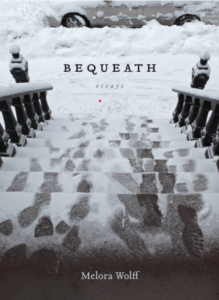Essayist Melora Wolff chats with me about her new collection of essays, Bequeath.

Bio:
Melora Wolff’s work has appeared in publications such as Brick, the New York Times, the Normal School, Speculative Nonfiction, Best American Fantasy, and Every Father’s Daughter: 24 Women Writers Remember Their Fathers, and has received multiple Notable Essay of the Year citations from Best American Essays. She is director of creative writing at Skidmore College in New York.
Welcome, Melora. What do you enjoy most about writing personal essays?
I’m most smitten with the intimacy and candor of personal essays, which can stir an immediate, empathetic relationship between strangers. And I love to discover the effects of language—of style–on truthfully remembered life. I started as a fiction writer and got my MFA in fiction writing, but I realized quickly that I was drawn more to essays. I like the ways that reflective prose shapes a life, the patterns of identity and sensibility that appear in memory-narration. Lost people and places can be revisited, reached somehow. In his book The Art of Time in Memoir, the essayist Sven Birkerts says that for many personal essayists, “the main incentive might be to connect with the elusive feelings and sensations of what happened so long ago.” I can relate to that. Birkerts names this motive for essaying “lyrical seeking.” I do seek the company of the elusive past in a very motivating way. There’s a constant river of stories and you can always find surprises in the depths of the long-ago that affect the present. The past is very active, very talkative and immediate in my thoughts so I enjoy that as an advantage and resource for writing instead of as a distraction. Most importantly, you really can’t write personal essays without enjoying some tough self-interrogation and hoping for change, or for the discovery of a useful insight. Writing personal essays is a very hopeful business, no matter what the subject may be.
Can you give us a little insight into a few of your essays – perhaps some of your favorites?
Many of the essays in my collection read like short stories. The book combines my love for fiction with my love for nonfiction. Short story techniques—like characterization, dialogue, speculation, scenes—help me to animate and clarify the facts in my essays. A lot of the essays are about growing up in New York City in the 1970s, in that vanished mood and era. In many ways, New York is really a central character. I enjoy writing about Manhattan—the city was exciting, dangerous, balanced on this thrilling cusp of change in a time of new feminism that was indelible and influential. The city draws people to it, sparks and challenges creativity, and it also harbors a lot of dark minds too, so all of these types of people appear in the essays. There are friends, family members, strangers, celebrities, criminals, notorious and known figures wandering straight out of history to walk the city’s streets. My essays are also threaded together thematically to explore the meaning of bequests that people bestow and impose on each other, out of love or longing or mistake. The essay “Joy,” which is a lyric essay, is about several women in my family and the emotional experiences women pass along to one another through generations, some of them kept well-hidden from men. I’m interested by the ways a treasured object can keep traveling with escalating value through a family and yet lose its origin story too, so I write about inherited objects that have lost their voice in some way. The title essay of the collection is about a silent piano. In many ways, I think of bequests as a kind of silent music sung through generations. “Masters in This Hall” is narrated in the playful collective voice of schoolgirls figuring out how to sing and celebrate themselves despite centuries of inherited myths about their roles. Those girls speak too in the essay “Mystery Girls,” which is about the terrifying Summer of Sam in New York City when there was such an electric current of fear passing through the city and between young women, and then that same summer, a city-wide blackout. All my essays are about the unstoppable, powerful currents that pass between people, for all sorts of reasons.
When did you first consider yourself a writer?
In kindergarten. I remember writing a particularly pleasing story about candy-canes that had big, colorful personalities. As a child, I kept up a steady output of poems, plays, stories, songs—I had a busy engine. But I think it’s also possible to consider yourself a writer, a creative, and yet not feel it fully until someone speaks to you or sees you as one. Every day I first consider myself a writer. It’s a constant realization, always fresh. As a writer, you get to live a life made of “first” realizations that have to be renewed again and again every time you sit down determined to make something.
What would you say is your interesting writing quirk?
To me, writing is one big quirk in itself. Sitting alone in a room, typing for hours–sometimes the same sentence over and over– is a fairly quirky activity. Even cats find it peculiar. You’d think they would be more sympathetic and tolerant.
As a child, what did you want to be when you grew up?
I wanted to be a jazz singer. I still want to be a jazz singer.
Is there anything else you’d like readers to know?
My collection is an homage to the city, to my family, and to the changes that happen to all of us when loved ones perish and leave something of themselves behind. Those bequeathed artifacts and ideas and longings we collect gradually will always be pure, valuable mysteries. Bequeath is a portrait and an elegy and I hope readers recognize in it something of their own families and questions. I hope they feel my gratitude at the heart of all the essays.
